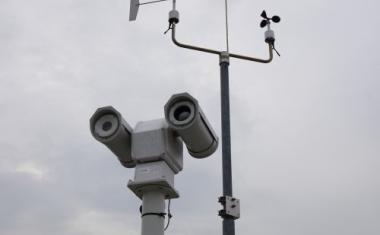Milestone Systems unveils an intelligent world at MIPS 2018
Christian Ringler, Director Middle East, Africa DACH, Milestone Systems - the worlds number one in video - explains why a combination of human and machine intelligence will solve ...


Christian Ringler, Director Middle East, Africa & DACH, Milestone Systems - the world’s number one in video - explains why a combination of human and machine intelligence will solve the challenges that face our world.
Worldwide we generate hours of digital video every second, and the huge volume of data a typical video system now creates is increasingly augmented by yet more data from other sensors and sources. This data is fast becoming a tsunami that threatens to overwhelm video system users and make it impossible to get a clear situational overview.
Until now, operators have simply taken a look at video and made a judgement, perhaps aided by video analytics. This aid could be simple motion detection alerting an operator to activity in an area, or sophisticated heat mapping in a retail environment. But it all centres around the operator, who is rapidly becoming a bottleneck in this workflow.
In every field of business there comes a time of disruption; for video security systems this time is now. Over recent years the industry has moved from analogue videotape and recorders, to networked digital video, and the reinvention of video as a data stream. Now we are entering the age of intelligent video systems.
Intelligent systems to the rescue
The only way to handle all the data created by video systems is to be cleverer, by deploying hardware acceleration and cognitive systems to spot issues faster, foresee incidents before they happen, and predict trends. The ability to react faster to any incident limits the impact and cost of handling an incident. But what if it was possible to avoid such an incident, by predicting it before it occurs?
To do this, video systems must be made more intelligent. Neural network technologies are now taking video content analysis far beyond the capabilities of legacy ‘rule-based’ analytics systems.
Rather than just evaluate a few pre-defined situations, cognitive video content analysis technology can learn directly from the video about objects and their relations, in effect establishing what is ‘normal’ behaviour. This allows the system to identify objects and situations in a scene and then alert an operator to unusual activities outside the norm, and predict events before they occur.
Computer-assisted systems
The use of cognitive systems can help and assist operators to make informed decisions faster and with more confidence. Cognitive systems are a category of technologies that use natural language processing and machine learning to allow people and machines to interact more naturally, to extend and magnify human expertise and cognitive abilities.
These systems will learn and interact to provide expert assistance to operators in a fraction of the time it takes for an operator today to make a qualified decision. However, these systems need tremendous computing power. This can be achieved by using hardware acceleration, where dedicated hardware handles the heavy lifting for the Video Management System (VMS). Another way is to integrate cloud services safely.
Either way, the openness of the VMS is the main issue, as the system has to be able to handle massive hardware acceleration or be able to interface effortlessly with cloud-based services. Robust cybersecurity is also vital. Whenever functions are added to any business-critical system, the system’s virtual armour has to be adjusted accordingly to ensure a safe computing environment. This is not something that can be simply ‘tacked on’: the system has to be designed with security in mind.
The driving force behind intelligent video
This step into the world of intelligent video is not a step any VMS manufacturer can take alone. There is a need for highly specialised knowledge and new specialised services. This need can only be delivered by a community of hardware, service and solution partners sharing their innovation with the wider community. This in turn adds functionality, devices and infrastructure services for intelligent video solutions. Integration partners are then able to deliver the intelligent solutions that best meet user needs, and can also demonstrate a return on investment on business video systems.
Hear it first from the world’s number one at MIPS
The VMS systems of today have delivered tremendous benefits by harnessing the integration possibilities of digital video to deliver enterprise and public productivity. The business video systems of tomorrow will forever change the way people interact with computing systems, and help them make complex decisions involving huge volumes of fast-moving data.
Milestone’s Community Event, MIPS, has become the benchmark for collaboration and innovation in the IP Video Surveillance industry. Now in its 13th year, 2018’s four-day event in Barcelona, Spain, between February 6 – 9 2018 will focus on how we can create an intelligent world by harnessing the power of our open platform community – together.
To see how a combination of human and machine intelligence will solve the challenges that face our world today, register to attend Milestone’s MIPS event by visiting: https://www.milestonesys.com/events/events/conferences/MIPS-2018/
Business Partner
Milestone Systems A/S - ArchiveBanemarksvej 50 G
2605 Broendby
Denmark
most read

Beachfront Innovation: High-Tech Beach Hut Access at Pristine Retreat
How Dom Tapkey Pro V2 secure access at Cool Spirit Luxury Holiday Apartments, located in Scarborough's North Bay

Integrated and Futureproof: Traka’s Next Chapter
Interview with Stefni Oliver on Traka’s Vision for the Future

Hochiki Europe Installs Fire Detection System at Cardiff’s Scott Harbour Redevelopment
Fire Safety Upgrade for Cardiff’s Scott Harbour with Hochiki ESP System

Airbus Defence and Space: Security as a strategic pillar of Europe's defense capability
Airbus Defence and Space protects sites, technologies and employees with modern security and cyber solutions - strengthening Europe's resilience in uncertain times

Active protection of woodland heritage: Flir thermal imaging cameras man the Ionian Arc of Puglia
Teledyne Flir: 24/7 fire detection for the land of the Ionian arc in Apulia










